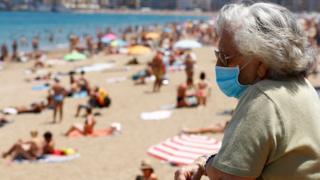 Image copyright
Reuters
Image copyright
Reuters
The Stormont executive is due to meet later to discuss the 14-day quarantine for travellers returning to Northern Ireland from Spain.
The mandatory measure came into effect at midnight on Saturday.
The decision to impose the quarantine would only have been made where the evidence was "incredibly strong", Justice Minister Naomi Long said on Monday.
There has been a recent significant surge in Covid-19 cases in Spain.
"No one wants to place restrictions on people's lives unnecessarily", Mrs Long told BBC Radio Foyle.
The executive only takes these decisions "where we believe it is absolutely critical to public health", she added.
"We don't want to cause disruption to people's lives, we don't want people to have to have restrictions placed on them where they are not necessary."
The executive is due to meet at lunchtime during which Mrs Long said the health minister will give "further information".
The quarantine mirrors the similar move announced by the UK government over the weekend.
Anyone who chooses to holiday abroad should be aware "things can change very quickly while they are away and we have to respond to that in a way that protects the people of Northern Ireland in general", the minister added.
The Department of Health said the decision to bring in the quarantine was taken following medical and scientific advice.
Health Minister Robin Swann said the decision "was not taken lightly".
After announcing the measures at the weekend, Mr Swann said he would call a meeting to consider "what support or advice measures may be needed for employees, employers and the self-employed, and what other actions may be needed".
Robin Swann probably had to take this call on his own over the course of the weekend.
He said in his initial statement he did it after discussing the matter with his counterparts elsewhere in the UK and clearly decided the wisest course of action was to move swiftly and impose that.
To some extent now, by calling the executive meeting, he's wanting to inform his colleagues and bring them into the tent with him in terms of explaining the decision that he took and the implications that flow from that.
We're expecting them to meet, probably over Zoom, around lunchtime.
The focus will probably be on what advice, potentially maybe financial support, should be given to people who are having to undergo this unexpected period of quarantine.
Despite advice from government not to travel to affected areas, if a flight still operates, customers are not entitled to a refund, according to Richard Williams, head of transport at the Consumer Council
Speaking on Radio Ulster's Good Morning Ulster programme, Mr Williams said those with flights booked should contact their airline.
"Airlines have been offering re-bookings and vouchers, so check what they will do for you but unfortunately, unlike the situation where your flight is actually cancelled - where you are entitled to a refund - there is no statutory entitlement to a refund," he said.
Holidaymakers should take a "cautious approach" to booking foreign travel, Mr Williams said.
He advised that travel restrictions "could change very quickly" and customers should be aware "not only of the advice about travelling and returning" but also what will happen when you get to your destination as "there may be travel restrictions there as well".
The Spanish health ministry reported more than 900 new cases of the virus on Friday.
The government of Catalonia has also said all nightclubs and late-night bars in the region are to close for the next two weeks due to a spike in infections.
Budget airline EasyJet said it was "disappointed" by the quarantine and would operate a full schedule in the coming days.
The UK's biggest tour operator, Tui, has cancelled all mainland Spanish holidays until 9 August.